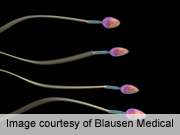FSH, inhibin B poor predictors of sperm count after cancer

(HealthDay)—Serum levels of follicle-stimulating hormone (FSH) and inhibin B are not good predictors of sperm levels in male survivors of childhood cancer, according to a study published online Feb. 19 in the Journal of Clinical Oncology.
Daniel M. Green, M.D., from the St. Jude Children's Research Hospital in Memphis, Tenn., and colleagues investigated the association of serum levels of FSH and inhibin B with sperm concentration in 275 adult male survivors of childhood cancer who had received gonadotoxic treatment placing them at risk of azoospermia.
Based on receiver operating characteristic analysis, the researchers chose 11.5 mIU/mL FSH and 31 ng/L inhibin B as cutoffs. Using these cutoffs to identify azoospermic survivors, they found that serum FSH levels had a specificity of 74.1 percent and a positive predictive value of 65.1 percent, while serum inhibin B levels had a specificity of 45.0 percent and a positive predictive value of 52.1 percent.
"Neither serum inhibin B nor FSH is a suitable surrogate for determination of sperm concentration in a semen sample," Green and colleagues conclude.
More information:
Abstract
Full Text (subscription or payment may be required)
Health News
Copyright © 2013
















